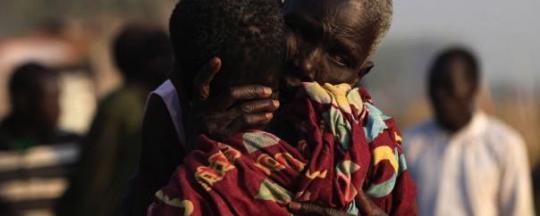“It’s like nothing before,” one woman who saw her sister-in-law gang raped told us. She is just one of many women who have said they had been raped – or witnessed rape – as they fled an area of South Sudan where government forces and their proxy Darfuri rebel group had burned and pillaged villages and attacked civilians.
South Sudan’s conflict has been dominated not so much by fierce battles between government and opposition forces, as by brutal attacks on civilians, often because of their ethnicity. Starting with round-ups and a massacre of ethnic Nuer in Juba, the conflict has spiraled into a series of revenge and counter-attacks on ethnic Dinka, Nuer, and other communities, plunging the country into a human rights and humanitarian crisis.
As donors meet on May 20 to try to address needs and avoid further catastrophe, they should also ensure funding is directed to address an under-acknowledged dimension of the conflict: rape and sexual violence.
Early in the conflict, government soldiers in Juba, the capital, targeted Nuer women. Witnesses told us that one group of soldiers gang raped one woman and that others abused another woman and abducted three others, who are still missing.
Another woman said that soldiers threw stones at the motorbike she was riding, causing it to fall. Then four of them dragged her into a car, drove to another part of town and raped her.
Fighting forces have killed thousands, along with the rapes and pillaging, forcing 1.3 million people out of their homes. Thousands have run to hard-to-reach areas, where many face drastic food shortages. People have been unable to plant crops and the country faces famine.
About 86,000 people are still in crowded UN bases, but they don’t always provide safe haven for women and girls. Within the camps on these bases, overcrowding and poor lighting create conditions that can increase the risk of sexual violence. Reports of harassment have been increasing over the months.
Aid workers have reported cases of rape and sexual harassment immediately outside of the UN bases, where government security forces in the towns of Bentiu, Bor and Juba have continued to bully, arrest and shoot at displaced Nuer, even during periods of relative calm.
Women leaving camps to collect firewood or grind their food have been subjected to sexual violence and harassment. UN peacekeepers should increase their patrols around the camps and in markets and main roads the displaced people use, with special attention to preventing sexual assault.
Rape carries with it enormous stigma in South Sudan and has always been under-reported. A report by the UN Mission in South Sudan (UNMISS) released this month has helped shed light on the situation by documenting over 80 cases, by both opposition and government forces.
In Juba, the UN reported, three girls were gang-raped by soldiers who broke into their home. Opposition soldiers in Upper Nile captured women, held them for many days in a house, and raped them.
The report documents a horrific case, among many others, in which soldiers and members of the Darfuri rebel group, the Justice and Equality Movement, raped women and then urinated into the victims’ mouths.
Vengeful opposition forces, in an attack on the Unity state capital, Bentiu, attacked women and used a local radio station to incite sexual violence. Amnesty International in a new report has also documented cases of rape in Juba and Malakal and in Unity state.
Both parties to the conflict should hold abusive forces to account and put an end to these crimes of sexual violence. Medical, psychosocial and counseling services for survivors of sexual violence were sparse to begin with in South Sudan.
In four major towns, fighting forces have targeted the main hospitals and offices of humanitarian agencies. Numerous other medical facilities across the conflict area have been pillaged or burned, reducing already very limited services.
Medical staff and humanitarian agencies desperately need funds to scale up support for rape survivors. Community groups should be funded to work with men and women to reduce the stigma that surrounds rape and collect evidence of cases of sexual violence, to be able to refer survivors to services and with an eye to providing accountability. Donors at Oslo should ensure support flows to meet these critical needs.
Displacement has brought suffering of many kinds to South Sudan’s women and girls, and sexual assault only adds to their torment. Funders have an opportunity to ensure support for services for the survivors of these attacks in locations such as the UN bases. They should take this opportunity also to try to reduce the stigma of rape and the abusive power of men with guns over South Sudanese women and girls.
By Skye Wheeler
The author is the South Sudan researcher at Human Rights Watch.




